
Music is just about as important as food in Hawaii. You will never go to any gathering where music is not
heard. It is part of island life. And this is an aspect of Hawaii you do not want to miss out on. Don't let the fact that some of it is in a language you don't understand scare you away or make you feel like an outsider. It's beauty and
joy and humor will transcend this if you let it.
For many people Hawaiian music is Don Ho, ukulele and steel guitar. They have only heard the hotel music of Hawaii. But there is much more. The traditional ki ho'alu (slack key) and falsetto style is still alive, actually enjoying a renaissance, but then so is all music of the islands. There is Hawaiian reggae, called Jawaiian, as well as pop and rock performers. Some of these artists, like Keali'i Reichel and Hapa, and recently Israel Kamakawiwo'ole, have made some inroads on the mainland. Below I've listed some of my favorites to get you started on your way to appreciating the new and traditional sounds of Hawaii.
The Ka'au Crater Boys
Basically the guitar and ukulele duo of Ernie Cruz and Troy Fernande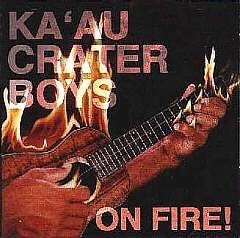 z, aided by various sidemen, doing upbeat and catchy pop/country/jawaiian, in
other words, good-time music. Tight harmonies and arrangements but the outstanding feature is Fernandez' incredible, hot-licks ukulele. My favorite album, On Fire, featuring North Shore, Opihi Man, House at Pooh Corner and the incredible title song.
z, aided by various sidemen, doing upbeat and catchy pop/country/jawaiian, in
other words, good-time music. Tight harmonies and arrangements but the outstanding feature is Fernandez' incredible, hot-licks ukulele. My favorite album, On Fire, featuring North Shore, Opihi Man, House at Pooh Corner and the incredible title song.
Hapa
Anothe r incredible duo, Keli'i Kaneali'i and Barry Flanagan, joined by superior studio
musicians and several well-known friends. The word "hapa" in Hawaiian means half, but is used to describe a person of half Hawaiian, half haole heritage. This music is just that. If you are an
acoustic guitar fan you're in for a real treat. Beautiful, haunting melodies and harmony as well as thoughtful lyrics, some in Hawaiian, some in English. I highly recommend both of these
albums. Also, Hapa always provides excellent liner note and lyrics with translations so you can listen to a song sung in Hawaiian and get the full impact of
r incredible duo, Keli'i Kaneali'i and Barry Flanagan, joined by superior studio
musicians and several well-known friends. The word "hapa" in Hawaiian means half, but is used to describe a person of half Hawaiian, half haole heritage. This music is just that. If you are an
acoustic guitar fan you're in for a real treat. Beautiful, haunting melodies and harmony as well as thoughtful lyrics, some in Hawaiian, some in English. I highly recommend both of these
albums. Also, Hapa always provides excellent liner note and lyrics with translations so you can listen to a song sung in Hawaiian and get the full impact of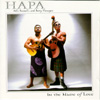 what these talented musicians are saying. This music is a rare expression of the real Hawaii, updated and modernized, but faithful to the roots of Hawaiian music. These two albums shown here, the self-titled Hapa,
and In the Name of Love are must-haves. I like too many songs to pick favorites, but one standout for pure imagination is In the Name of Love (yes, the U2 song) wherein they combine Martin Luther King's famous speech with an oli, a Hawaiian chant. Gives me
chicken skin every time.
what these talented musicians are saying. This music is a rare expression of the real Hawaii, updated and modernized, but faithful to the roots of Hawaiian music. These two albums shown here, the self-titled Hapa,
and In the Name of Love are must-haves. I like too many songs to pick favorites, but one standout for pure imagination is In the Name of Love (yes, the U2 song) wherein they combine Martin Luther King's famous speech with an oli, a Hawaiian chant. Gives me
chicken skin every time.
Keali'i Reichel
Where does one start with this phenom? Reichel has almost single-handedly brought
Ha waiian music, real Hawaiian music, into the mainstream. A tremendous showman,
gifted singer and player, he is backed by lush arrangements and flawless production. His style is quite varied, b
waiian music, real Hawaiian music, into the mainstream. A tremendous showman,
gifted singer and player, he is backed by lush arrangements and flawless production. His style is quite varied, b ut he always includes
and oli and sings some songs in Hawaiian and some in English. He even covers some show tunes periodically, but his tender, sincere ballads will always be my favorites. I also appreciate this
man as a human being, especially for his selfless devotion to promoting the Hawaiian language and the constant support he provides Na Punana Leo, our Hawaiian language immersi
ut he always includes
and oli and sings some songs in Hawaiian and some in English. He even covers some show tunes periodically, but his tender, sincere ballads will always be my favorites. I also appreciate this
man as a human being, especially for his selfless devotion to promoting the Hawaiian language and the constant support he provides Na Punana Leo, our Hawaiian language immersi on program. He probably plays more free concerts to benefit our children than anyone else. And this concern for olelo Hawaii is evident in his
music, which is consistantly praised for its faithful use of Hawaiian. Like Hapa, he always includes very detailed liner notes and lyrics, even explaining the kauna, the hidden meaning, of some of his
songs. These are three of my favorite albums, Lei Hali'a, Kawaipunahele and E O Mai. The title song E O Mai will always be one of my favorites. I can now almost listen to it without tearing up.
on program. He probably plays more free concerts to benefit our children than anyone else. And this concern for olelo Hawaii is evident in his
music, which is consistantly praised for its faithful use of Hawaiian. Like Hapa, he always includes very detailed liner notes and lyrics, even explaining the kauna, the hidden meaning, of some of his
songs. These are three of my favorite albums, Lei Hali'a, Kawaipunahele and E O Mai. The title song E O Mai will always be one of my favorites. I can now almost listen to it without tearing up.
Don Tiki
Here's so mething completely different. This band has faithfully, though with tongue
firmly planted in cheek, recreated the lounge music of Hawaii that was so popular in the 50s, right down to the birdcalls. The musicianship is absolutely first-rate, and there are several guest
artists like Martin Denny, king of schmaltzy piano, as well as Teresa Bright and Jimmy Borges. I can imagine being in a backyard luau in Cincinatti, circa 1953, with tiki torches blazing listening to this great
stuff. By the way, the band leader goes by Perry Coma. With songs like Occasional Man, Barbi in Bali, Maidenhair Fern, Clutch Cargo Cult and Bam-Boozled you can understand why this CD is titled The Forbidden Sounds of Don
Tiki. It was recorded in "pulsating polynesian polyphonics" by the way.
mething completely different. This band has faithfully, though with tongue
firmly planted in cheek, recreated the lounge music of Hawaii that was so popular in the 50s, right down to the birdcalls. The musicianship is absolutely first-rate, and there are several guest
artists like Martin Denny, king of schmaltzy piano, as well as Teresa Bright and Jimmy Borges. I can imagine being in a backyard luau in Cincinatti, circa 1953, with tiki torches blazing listening to this great
stuff. By the way, the band leader goes by Perry Coma. With songs like Occasional Man, Barbi in Bali, Maidenhair Fern, Clutch Cargo Cult and Bam-Boozled you can understand why this CD is titled The Forbidden Sounds of Don
Tiki. It was recorded in "pulsating polynesian polyphonics" by the way.
Gary Haleamau
Local Kona boy and very good musician, as well as a wonderful person. Known
primarily for his almost inhuman falsetto ability, Gary is also an excellent slack key player. His music is much more in the traditional style and is almost all in Hawaiian. This is my favorite album of his, Ho'opomaika'i. Oh yeah, he also yodels like a madman. Favorite
song: E Ku'u Lei, E Ku'u Ipo.
boy and very good musician, as well as a wonderful person. Known
primarily for his almost inhuman falsetto ability, Gary is also an excellent slack key player. His music is much more in the traditional style and is almost all in Hawaiian. This is my favorite album of his, Ho'opomaika'i. Oh yeah, he also yodels like a madman. Favorite
song: E Ku'u Lei, E Ku'u Ipo.
The Pahinui Brothers
All 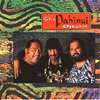 the brothers are great on their own, but this particular album is one of my favorites.
Bla, Cyril and Martin just sound so good. This is a combination of slack key, blues and Hawaiian traditional and somehow it works great. My favorite song is Jealous Guy. Wonderful vocals. If you like
this be sure and check out their huge selection of solo albums, too. And don't forget Gabby.
the brothers are great on their own, but this particular album is one of my favorites.
Bla, Cyril and Martin just sound so good. This is a combination of slack key, blues and Hawaiian traditional and somehow it works great. My favorite song is Jealous Guy. Wonderful vocals. If you like
this be sure and check out their huge selection of solo albums, too. And don't forget Gabby.
Peter Moon
Peter Mo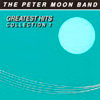 on has been around a long time and has more albums out than I can remember. He tends to rock a bit more than a lot of his
contemporaries and has a rougher, more gravelly singing voice. a good introduction to Peter Moon is his Greatest Hits Collection #1, featuring Slack Key Samba, Slack Key Minor Blues, Unchained Melody and my personal fave, Chinatown.
on has been around a long time and has more albums out than I can remember. He tends to rock a bit more than a lot of his
contemporaries and has a rougher, more gravelly singing voice. a good introduction to Peter Moon is his Greatest Hits Collection #1, featuring Slack Key Samba, Slack Key Minor Blues, Unchained Melody and my personal fave, Chinatown.
Israel Kamakawiwo'ole
Brother Iz left us in 1997 after succombing to morbid obesity. He will always be
re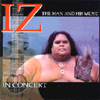 membered here for his warmth, his self-deprecating humor and his talent as a singer
and gifted ukulele player. I remember seeing Brother Iz at the Keahole airport shortly before his death, and though he could only walk with extreme effort and even performed with oxygen, he never
stopped. Recently his music has gotten some mainland attention with the release of the movie, Hannibal, in which his version of Somewhere Over the Rainbow is heard. It's unfortunate that people
are only now discovering this literally huge talent. He was a gentle soul and Hawaiian through and through. I love all his albums, but have picked this live one, Iz, the Man and His Music, released posthumously, because it has so many of
my favorites, like N Dis Life, E Ala E and Maui, Hawaiian Suppa Man. By the way, his name, Kamakawiwo'ole means fearless eyes. We will miss him.
membered here for his warmth, his self-deprecating humor and his talent as a singer
and gifted ukulele player. I remember seeing Brother Iz at the Keahole airport shortly before his death, and though he could only walk with extreme effort and even performed with oxygen, he never
stopped. Recently his music has gotten some mainland attention with the release of the movie, Hannibal, in which his version of Somewhere Over the Rainbow is heard. It's unfortunate that people
are only now discovering this literally huge talent. He was a gentle soul and Hawaiian through and through. I love all his albums, but have picked this live one, Iz, the Man and His Music, released posthumously, because it has so many of
my favorites, like N Dis Life, E Ala E and Maui, Hawaiian Suppa Man. By the way, his name, Kamakawiwo'ole means fearless eyes. We will miss him.
There are dozens of other artists and groups worth noting, and new ones appearing all the time. Some others to check out are Sista Robi Kahakalau, Bruddah Walter, Willie K., Harold Kama, Jr., Walter Boy Tavares, Cecilio & Kapono, The Cazimero Brothers, Keola Beamer, Teresa Bright, Brother Noland, Ken Emerson, Fiji, Makaha Sons, Na Leo Pilimehana, Sean Na'auao, B.B. Shawn, Sunday Manoa just to name a few more.
For the best on-line selection of Hawaiian music I have ever seen, plus music books
and even hula info, check out this site: Mele.com Hawaiian Music Island. They should have every CN
No Empty Sky
No Empty Sky, the latest collaboration from electric mandolinist Kona Lowell, represents a return to the more thoughtful songs that defined his earlier writing, and while hardly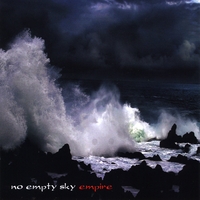 what would be considered "Hawaiian music," the sometimes tranquil,
sometimes violent and always present ocean that encircles his Big Island home finds its way into many of these songs and is an unavoidable, powerful influence. And as far as we can tell, this CD
contains the only progressive rock song ever written about Hawaii: Yellow Bird (Hawaii Nei).
what would be considered "Hawaiian music," the sometimes tranquil,
sometimes violent and always present ocean that encircles his Big Island home finds its way into many of these songs and is an unavoidable, powerful influence. And as far as we can tell, this CD
contains the only progressive rock song ever written about Hawaii: Yellow Bird (Hawaii Nei).
Joined by Taiwanese-born percussionist/vocalist Chee and Native American (Blackfeet) drummer Jim Summey, No Empty Sky's
Empire recalls a time in modern music when words were important, creativity an asset and music was not easily pigeon-holed. The very personal songs on this CD span a
wide range of styles while the lyrics tackle topics as varied as socio-political issues, soul-deep emotions of loss and joy as well as spiritual hunger and the painful, inevitable corruption of religion.
Also generously sharing their talent for this project are James Vicari, who provided additional keyboards on Yellow Bird (Hawaii Nei) and Andy Rising who contributed cello to the title song, Empire.
Fun Factoid: Most listeners to No Empty Sky will be surprised to learn that what sounds like an electric guitar is actually an electric mandolin. There is no guitar on this CD. Kona also played bass, flute and keyboards.
We hope you enjoy this CD as much as No Empty Sky did recording it. Maluhia a me aloha kakou. Buy it here.
Hawaii, Kona, Kailua-Kona, volcano, dolphins, whales,
Puna, Kohala, Waimea, Eye of Hawaii, diving, Hilo, web services, graphic design, web design, kona coffee, Big Island
paradise, parks, surfing, fishing, billfish, hiking, camping, orchid, dining, tour, Ironman, Chee and Kona, Chee's Tek
Center, Dolphin Sky foundation, Rise and Shinee